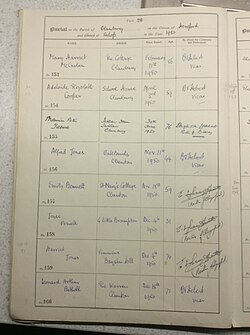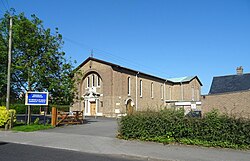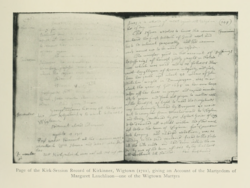A majority of church records within the United Kingdom are historically similar between religions. The most commonly used are registers of baptism, marriage and burial which exist in most religions in the UK. You may also come across minutes of church meetings such as vestry minutes from the Church of England and kirk sessions records from the Church of Scotland. The United Kingdom has a diverse history of nonconformist religions comprising of similar records. You will perhaps most commonly come across the Church of England, Church of Scotland and Catholic Church records, however there are many other nonconformist religions.
Research your ancestors on MyHeritage
Church of England records in the UKChurch of England records in the UK

The records of the baptisms, marriages and burials within the Church of England are known as parish registers. Some date back to 1538. Earlier records give very little information such as just the name of the deceased and their date of interment for burial records. From 1753 marriage registers were standardised using pre-printed forms therefore supplying us with more information such as the bride and groom's parish of residence and the names of at least two witnesses. Baptism and burial registers were supplied with printed forms from 1812. Copies of the registers were taken periodically and sent to the Bishop. These are known as Bishop's Transcripts. Parish registers are normally held by the relevant county archive with some available online.
You may find your ancestor named in other church records, such as churchwarden accounts and vestry minutes. Churchwardens were resonsible for keeping track of church funds, such as payment for pew repairs or bell-ringing. The vestry was a group of the respected elders of the parish who met regularly to discuss relevant goings-on within the parish. These records are also held by the local county archive. You can find out more about Church of England records that have survived at Church records in the United Kingdom - Church of England.
Catholic Church records in the UKCatholic Church records in the UK

Records from the Catholic Church within the UK do not survive as well as those from the Church of England. This is due to the persecution they faced within the country. As a result, many Roman Catholic churches did not keep written records until after the Catholic Emancipation Act of 1829. Another difficulty facing researchers is that prior to 1965 registers tend to be kept in Latin and will therefore need translating. Registers of baptism, marriage and burial provide similar information to that of the Church of England. One extra detail is that baptism registers should name the godparents or sponsors whom are often relatives. Registers are usually retained by the chapel.
Other Catholic church records include that of confirmation, confessions, benefactors and church diaries. You may also find evidence of your Catholic ancestor in the UK via recusant rolls, returns of papists or the Protestation Oath of 1641/2. You can find out more about Catholic Church records at Church records in the United Kingdom - Catholic Church.
Church of Scotland records in the UKChurch of Scotland records in the UK
The Church of Scotland keeps records of baptisms, marriages and burials within old parochial registers (OPRs). Registers were not kept as regularly as within other religions meaning many events were not recorded. Burial registers are lacking in particular within the Church of Scotland. Some registers do not begin until 1780 but most start from the last 17th century or early 18th century. You may discover relatives from England marrying in the Scottish borders from 1754 onwards after an English law introduced stricter rules about who could marry. As Scotland did not impose the same limitations, many travelled over the border to be wed. Most OPRs can be viewed via ScotlandsPeople.

Further evidence of your ancestors within the Church of Scotland records may be found via kirk session minutes. This was the lowest court within the church that dealt with minor cases of moral issues, such as adultery. Punishments could include fines. The kirk also had responsibility for caring for the poor within their parish boundaries. Kirk sessions minutes are being gradually released online at Scotland's People. You can find out more about Church of Scotland records at Church records in the United Kingdom - Church of Scotland.
Nonconformist Church records in the UKNonconformist Church records in the UK
If your ancestor was a nonconformist you may find evidence of this in:
- Non-parochial registers- records of baptism, marriage and burial for nonconformists are referred to as non-parochial registers. In 1840 and 1857 these were required to be deposited with the Registrar General and are now held by The National Archives. Not all were submitted.
- Quarter sessions and Assize records- including details of fines for being absent from church and registration of nonconformist wills
- Manorial records
- Protestation Oath returns of 1641/2- Only adult males who swore allegiance to the Church of England appear in the main listing. Any Catholics or other nonconformists who refused to take the oath should be listed separately.
- Recusant rolls- A majority of the people listed are believed to be Catholic but their exact religion is not given
- Compton Religious Census of 1676- The number of Catholics and other nonconformists in each parish were requested. Names are given rarely.
- Nonconformist newspapers and magazines- Many religions publish their own newspapers and magazines which discuss theological matters as well as news of their congregation including marriages and deaths
See alsoSee also
Explore more about Church records in the UKExplore more about Church records in the UK
- United Kingdom - Birth, Marriage & Death record sets at MyHeritage
- United Kingdom - Church Records record sets at MyHeritage
- Understanding and Using Scottish Kirk Session Records webinar at Legacy Family Tree Webinars
- England and Wales – Rummaging in the Parish Chests webinar at Legacy Family Tree Webinars
- Burials and Burial Grounds of England and Wales webinar at Legacy Family Tree Webinars
References

